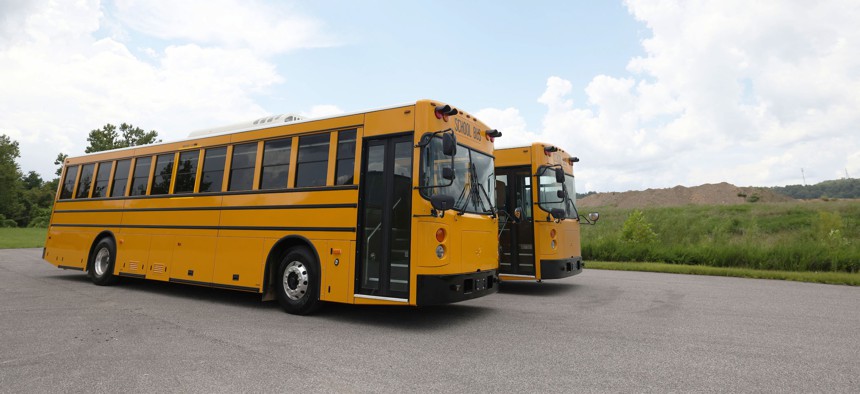Feds Open More Funding for Diesel School Bus Phase-out

Green Power Motor Companys BEAST EV school bus outside of the production facility in West Virginia. Chris Jackson for The Washington Post via Getty Images
The decision comes as demand far surpassed funding available this year for an initiative that aims to transition school buses to electric models and other options with lower emissions.
The U.S. Environmental Protection Agency says it will nearly double the funding available this year for school districts to purchase low- or zero-emission buses.
The move comes in response to high demand for the program among applicants, EPA said. In May, the agency made $500 million available for the 2022 Clean School Bus Rebates under a program created by the $1.2 trillion, bipartisan infrastructure law President Biden signed last year. But after receiving around 2,000 applications totaling almost $4 billion in requests, the agency announced last week that it would increase this year’s funding to $965 million.
“America’s school districts delivered this message loud and clear—we must replace older, dirty diesel school buses,” said EPA Administrator Michael Regan in a statement.
The majority of applications were for zero-emission electric school buses, according to the EPA. Around 9% were for propane buses and 1% for compressed natural gas buses.
This is the first round of funding from the Clean School Bus Program, which will see $5 billion over five years. The EPA plans to make $1 billion available for clean buses in fiscal 2023, which began Oct. 1, and expects to launch a grant competition in the coming months.
By the end of the application period in August, all 50 states, as well as Washington D.C., Puerto Rico, the U.S. Virgin Islands, Guam, American Samoa, and federally recognized tribes, applied for the program. The EPA is now reviewing applications with plans to issue awards this month.
The Electrification Coalition—an electric vehicle advocacy group that has worked with city and state governments to create electric bus purchasing programs—lauded the expansion of this year’s awards.
“Electric school buses will reduce kids’ exposure to toxic diesel emissions while providing significant cost savings for school bus operators—all while increasing our national and grid security,” said executive director Ben Prochazka in a statement.
Diesel emissions have been linked to asthma and other negative health effects that can keep students out of school. In addition to addressing the transportation sector’s role in fueling climate change, the Clean School Bus Program aims to reduce people’s exposure to those harmful emissions, particularly in disadvantaged communities.
The EPA said that the 2022 Clean School Bus Rebates prioritized low-income and tribal communities and meets the Biden Administration’s Justice40 initiative, which aims to deliver 40% of the benefits from certain federal programs to underserved communities.
Molly Bolan is the assistant editor for Route Fifty.
NEXT STORY: Curbside Composting Program Billed as Nation's Biggest Gets Underway






